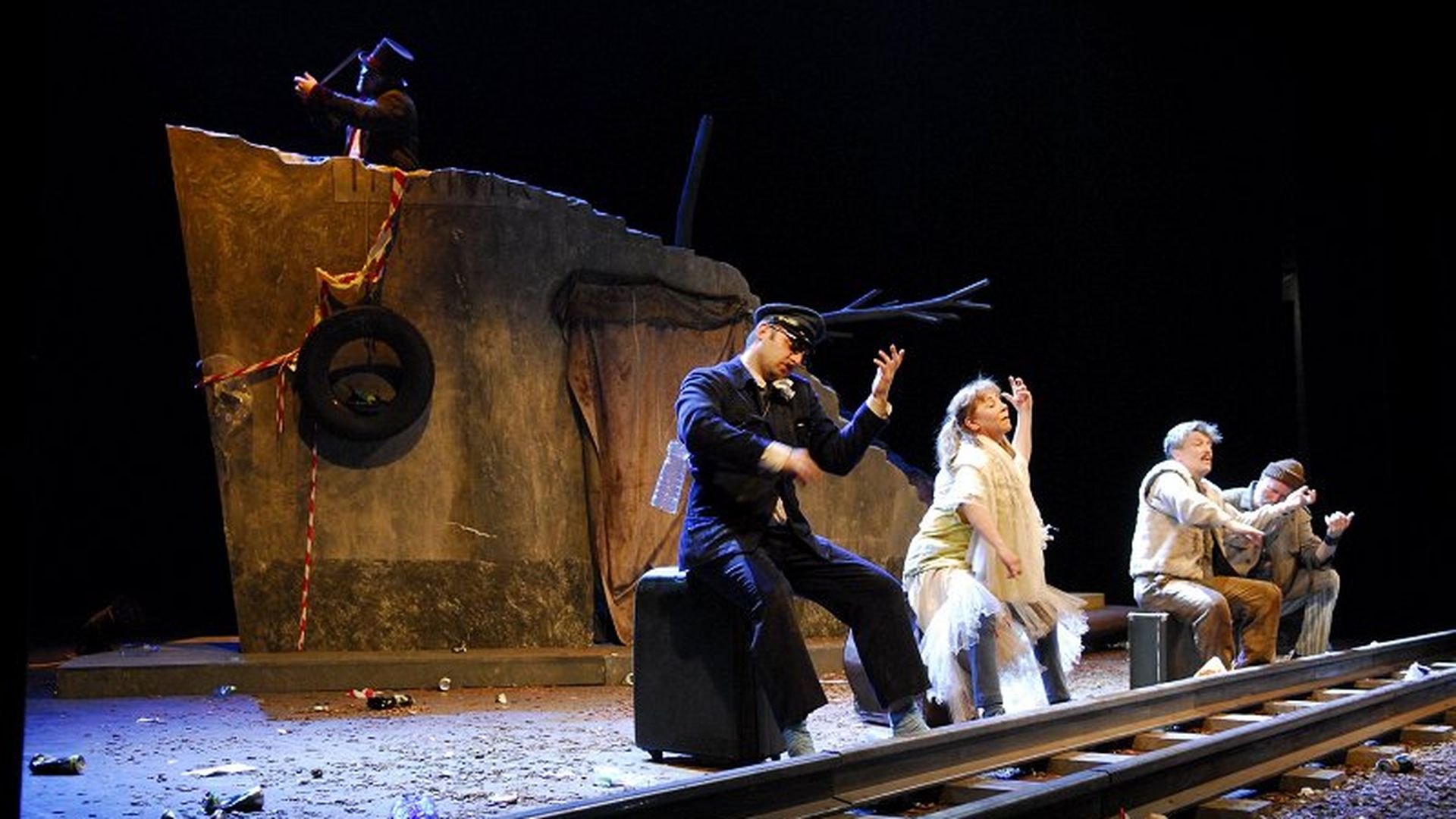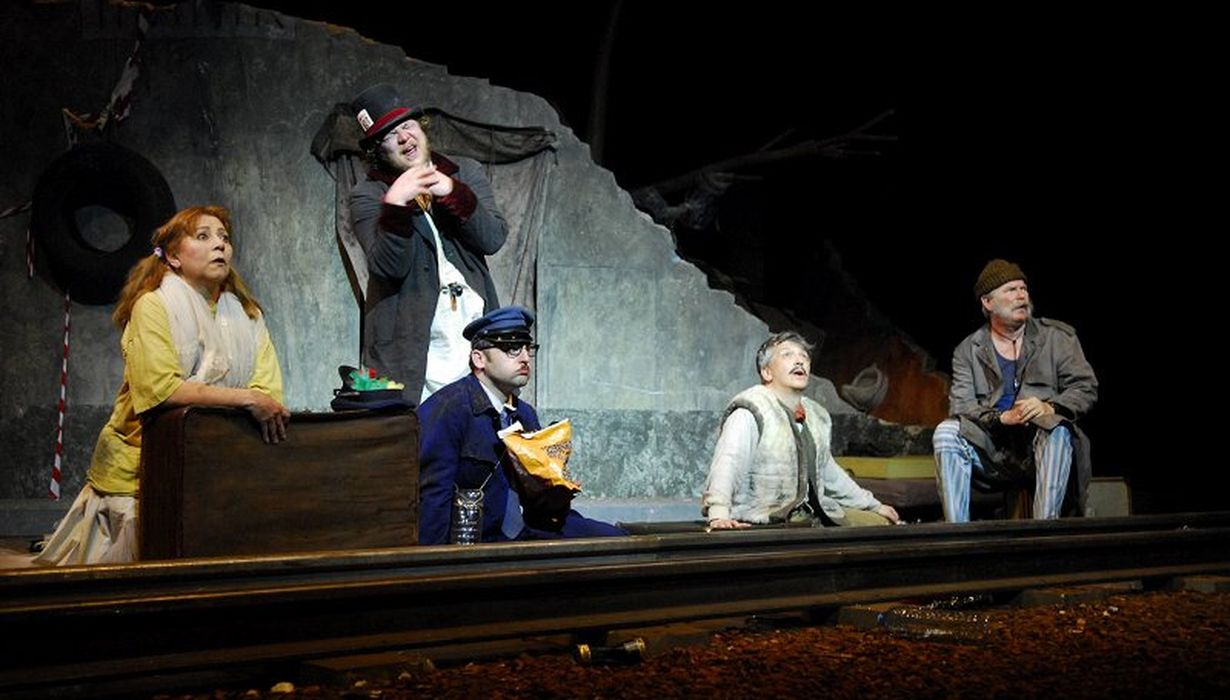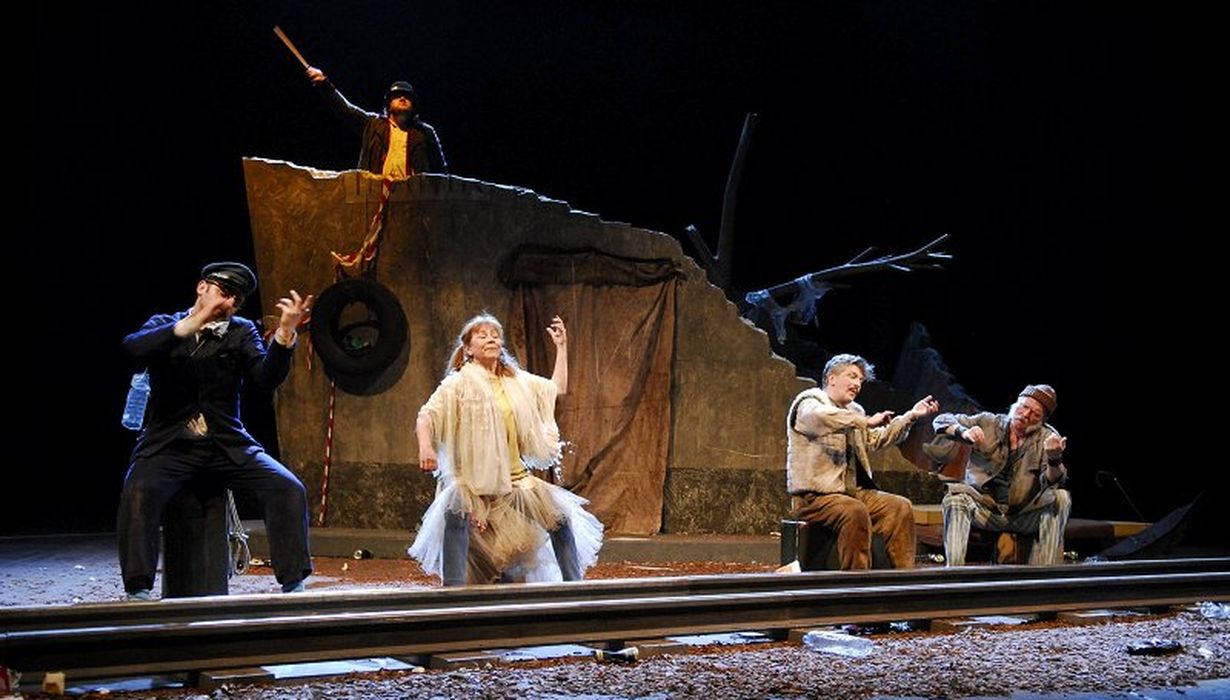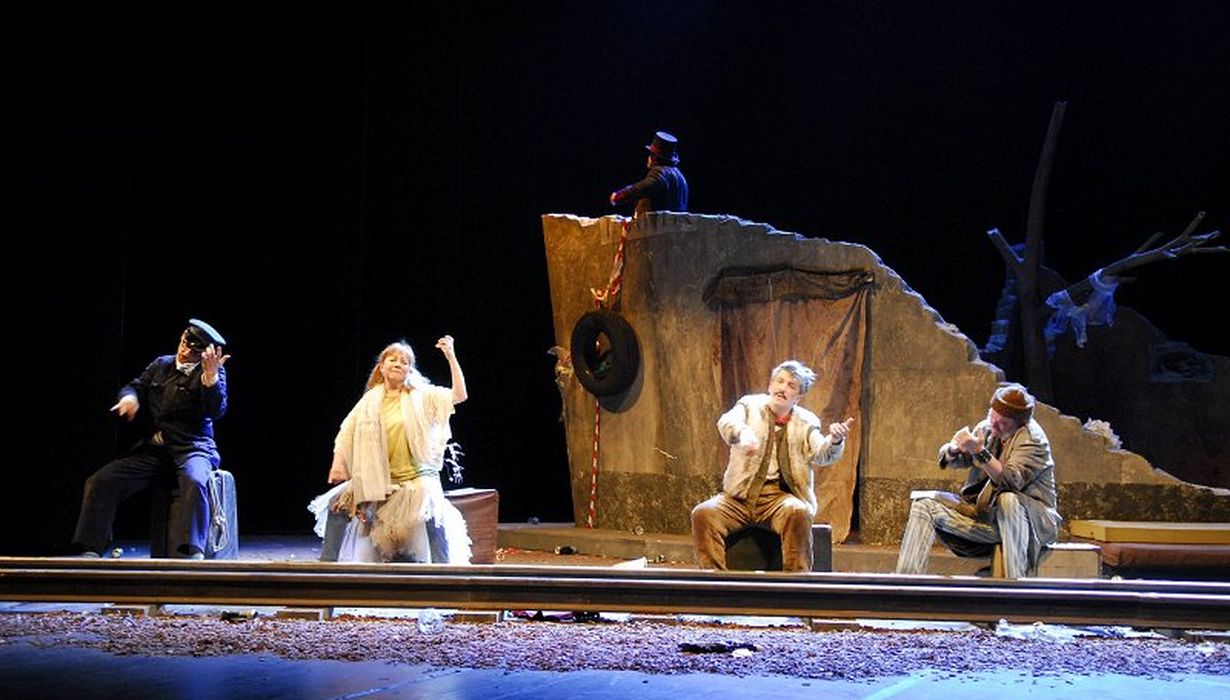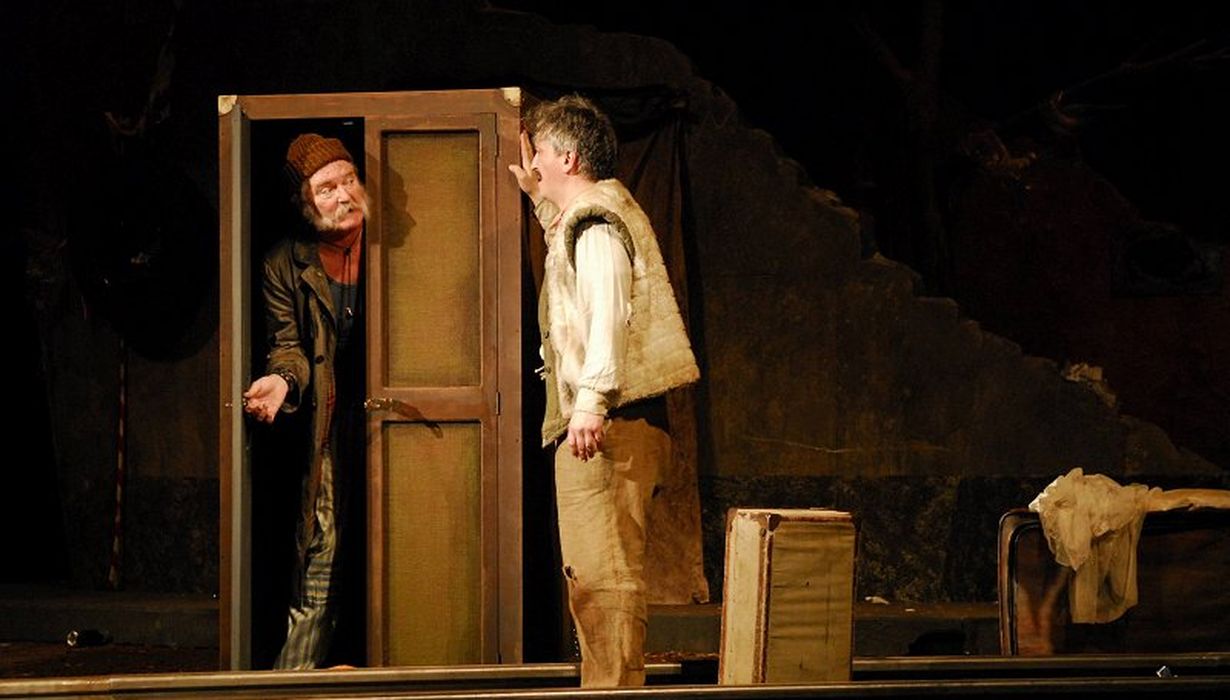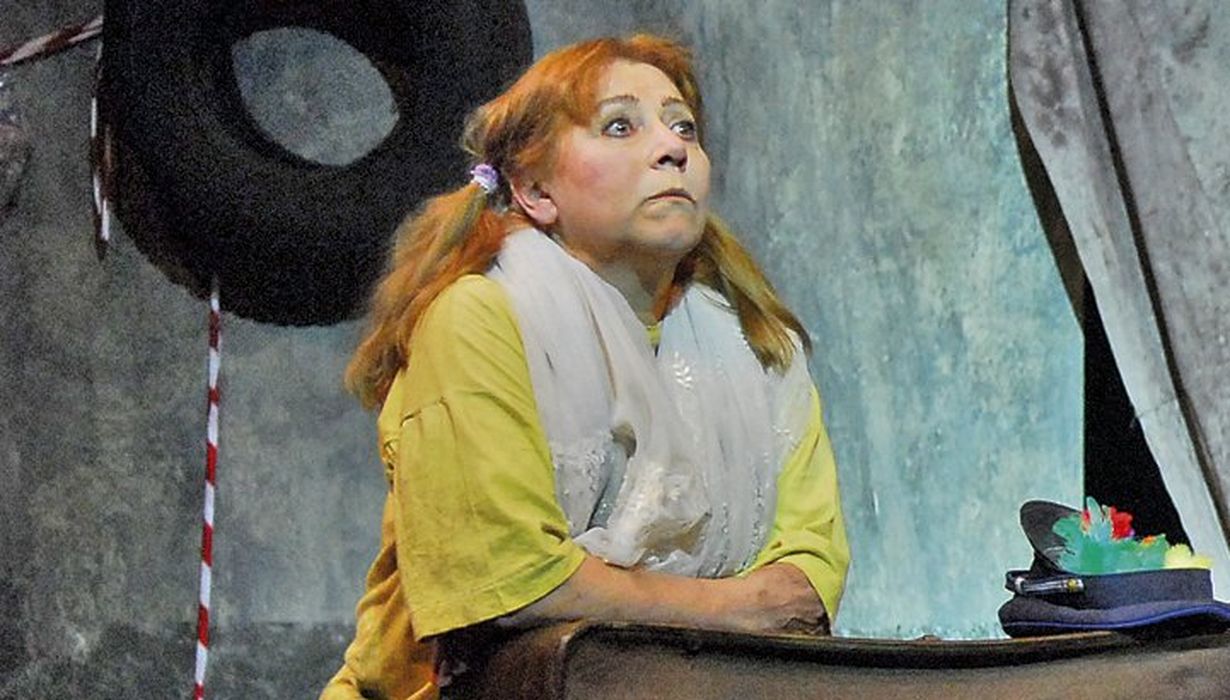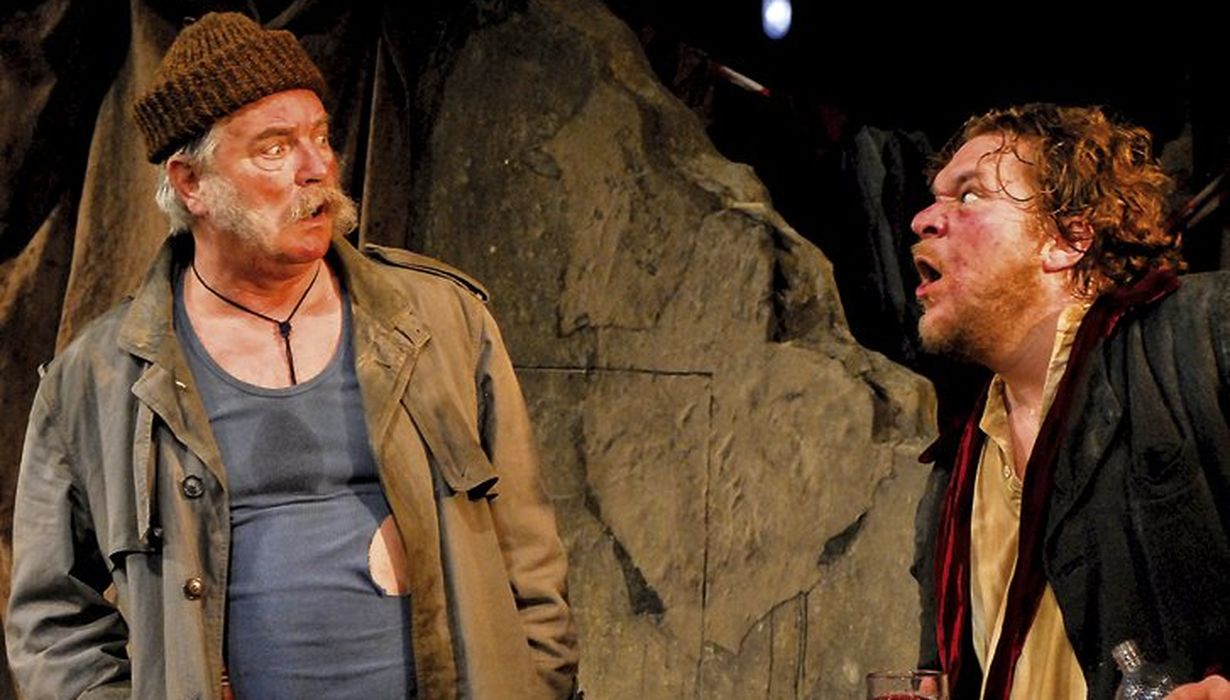The Titanic Orchestra
Orkestr Titanik
First Slovene production
PREMIERE
21. marec 2007
»An illusion is one of the most powerful things that a human being has, it empowers him to survive,« says the Bulgarian author of political satirist and comedian Hristo Boychev (1950), who received many awards for his plays and were successfully presented on many stages across Europe, America, Asia and Australia. His firs encounter with the Slovene audiences will the his chamber play The Titanic Orchestra, subtitled as a sad comedy. The play narrates a story of four homeless people who squatted an abandoned railway station and are now desperately waiting for a train to take them away from their misery ... one day, a train does stop there, but only to let out another lost soul, a certain Harry Houdini, who is willing to - in exchange for a daily dose of alcohol - teach the present company some magic tricks. Life at the railway station is suddenly full of bizarre occurrences, illusions become real and absurd events from the life of the homeless are slowly turning into a metaphor of the Beckettean »lost state« of a contemporary man.
Creators
-
Translator
Borut Omerzel -
Director
Matjaž Latin -
Dramaturg
Tea Rogelj -
Language Consultant
Srečko Fišer -
Set Designer
Đorđe Bjelobrk -
Costume Designer
Matjaž Latin -
Assistant to Costume Designer
Tanja Zorn Grželj -
Adviser for Tricks
Ravil Sultanov, Nataša Sultanova -
Composer
Boštjan Gombač -
Light Designer
Samo Oblokar
Performing
In the Media
A sad chamber comedy The Titanic Orchestra is full of witty ideas and humour, which resound both, the poetry of the absurd and the directness of the slapstick comedy. The heroes themselves offer both – four homeless people who occupied a deserted railway station. Although on the margin of the society, they refuse to give in. They fill their days with waiting for a train, but the train never stops: the force that drives their lives is, namely, an illusion that life is better elsewhere. Their little world is turned upside down with the arrival of Harry, an illusionist, a master of chimeras of all sorts – show and alcohol, religion and business. However, Harry also opens the door of imagination to his fellow sufferers, the door of a parallel world into which one can disappear whenever desired.
Lea Širok, RA Koper, 22 March 2007
The theatre in Nova Gorica hit the nail on the head: it offered us a complex and carefully written piece that provided several strings for thought. Not only about the illusion of the world and the politics in it, not only about the society, its linearity and stampede mentality, but mostly and above all about the loneliness of the human soul … a set that is pleasant to the eye and functional at the same time, excellent costumography – also the work of director Matjaž Latin – and a cast in top form.
Tomaž Simon, RA Slovenia 1, 22 March 2007
Titanic Orchestra is a loopy piece; it springs from the juncture of realism and absurd, like another story from the edge. The marginalised and the drunkards at the train station – not, in fact, a real train station, as the trains almost never stop there; it is simply a place where a not quite empty bottle might be thrown off them and hit you on the head – have a dire plan: first they practise how to steal a suitcase of a train, but what they really want is to travel away, anywhere. Then a drunkard of all drunkads arrives: Henry, who starts lecturing them. About business. Showbusiness. Reality. The world as a stage. Illusion. He puts them on a train. And then they realise: there is no train. They are not real. They are a dream of a ghost. After this revelation they all disappear. All bar one, who remains and continues to ask himself has he not disappeared as well.
The performance of the director and costumographer Matjaž Latin first and foremost took care of the verist part: the threadbare and torn costumes, the scene set on a litter-strewn stage, cut in half with rails and a vision of a dilapidated station building in the back. This emphasises cleverly enough the post-transitional moment that put these people on a side track. A witty change from the Balkan-specific Ode to Joy into a more serious, German-sounding version adds a special and colourful touch. However, the most radical and far-fetched interpretation is the introduction of a new character; in several scenes, we can see the dreamer himself, the immobile propeller of the action personified, of whom nothing except a scarf is left at the end, a nestor and a frail old man who, obviously somnambulant wanders through his own dreams, wearily and carefully, like a dreamer in wonderland. This shift in meaning of course immediately cuts any possibility to see in Harry a simple and sotted Godot, a miserable soul without an aura.
Matej Bogataj, Delo, 24 March 2007
In the illusionary world of Hristo Boytchev there is no death, only the searching to find self, one's intimate world and life itself. A script absurd enough to ring darned real! Director Matjaž Latin leads this exposed (non-)absurd with sprinkling comical elements into the dream-like poeticism which freed the performance of the pragmatism and bitter realism and lifted it into a dream world of individuality and uniqueness of every single person.
The part of the actors was harmonious and convincing in this thought-action space. The quartet of the homeless, with their ruined lives and their memories of their (self-conceived) glorious youth, paints the entrapment into the loop of reality and the escape from it with a simple naïveté and bitter aftertaste, even melancholic despair, which gradually saves itself into joyful dreams.
Marij Čuk, Primorski dnevnik, 24 March 2007
Very very near the tree under which Estragon and Vladimir are forever waiting for Godot there is a railway station where trains don't stop. This play about tedious waiting is really quite entertaining when directed by Matjaž Latin. A Balkan variety of absurd humour and poetic melancholy intertwine to tell the story about a quartet of homeless. Latin's thoughtful direction cleverly includes all elements – the homeless wearing scruffy clothes, stained tracksuits, dirty wedding gowns are trapped between the half demolished railway station and the tracks; light designer Samo Oblokar artfully creates passing trains with blasts of light, which every now and then pierce the darkness. Magic-trick trainers Ravil Sultanov and Nataša Sultanova taught Primož Pirnat several magician skills, which are admired by the audience and also by the characters on stage, for the sotted magician performs some sort of performance within the performance, a play within the play.
Andraž Gombač, Primorske novice, 26. 3. 2007
The big stage of SNG Nova Gorica gave birth to another performance which is thoroughly enjoyable for the audience. Director Matjaž Latin confidently embarked upon the adventure of untangling this unusual text, which hides the elements of the absurd alongside the realistic scenes, but also poetic lyricism. The whole could become burlesque, but Latin managed to avoid that and allowed soft lyricism, wrapped into the melancholy of those who try to drown their mistakes and failures in alcohol and save themselves from loneliness to take the first place. Four actors – the homeless – Iztok Mlakar, Gorazd Jakomini, Branko Ličen and Mira Lampe Vujičič accomplished his vision and poetic nuances with great feeling for balance between the witty and humorous moments – imbued with typical Balkan humour – and the tender lyrical idea which added special charm to the entire performance.
Primož Pirnat excelled in chiselling the traits of his character, he sculptured them from various psychological nuances, filled it with heart-warming goodness and gave it an almost frenzird look of a person who believes he has become omnipotent, especially since the paths of his magic are drenched in alcohol, without which he will not do anything.
Iva Koršič, Novi glas, 29 March 2007
The action is marked with typical Balkan humour. The performance shifts between the dramatic and the comic, intertwines the realism, absurd and lyricism. At the end, the Titanic takes us to the world of illusion, the world where anything is possible. Just like in theatre … If we believe in illusion, we can change the world, if only our own.
Judita Valič, Dobro jutro – Nova Gorica, 31 March 2007
It is nice to see a theatre that puts a play of a Bulgarian author on its repertoire, so we can familiarize ourselves with a representative of a less know culture in the multitude of British and American scripts. Matjaž Latin and his six actors created a performance, which is lively despite being static and witty despite its bitterness.
Mirjam Novak, Naša žena, 4 May 2007
Festivals and performances abroad
- Festival Kluže, 2007
- Festival Carniola, Kranj, 2007
- Narodno pozorište Tuzla, 2007
- Orient-Express, Mednarodni gledališki festival ETC, Nova Gorica in Stuttgart, 2009
11. 6. 2007, 21.00. Festival Kluže.
10. 7. 2007, 21.30. Festival Carniola, Kranj.
11. 7. 2007, 21.00. Festival Kluže.
17. 11. 2007, 19.30. Narodno pozorište Tuzla.
5. 12. 2007, 19.30. Rudniška dvorana Idrija.
11. 12. 2007, 20.00. Kinogledališče Tolmin.
12. 12. 2007, 20.00. Kosovelov dom Sežana.
4. 2. 2008, 19.00. Trbovlje..
24. 6. 2009, 21.30. Železniška postaja Nova Gorica..
17. 7. 2009, 19.30. Stuttgart, Germany.
26. 3. 2021, 12.00. splet.



